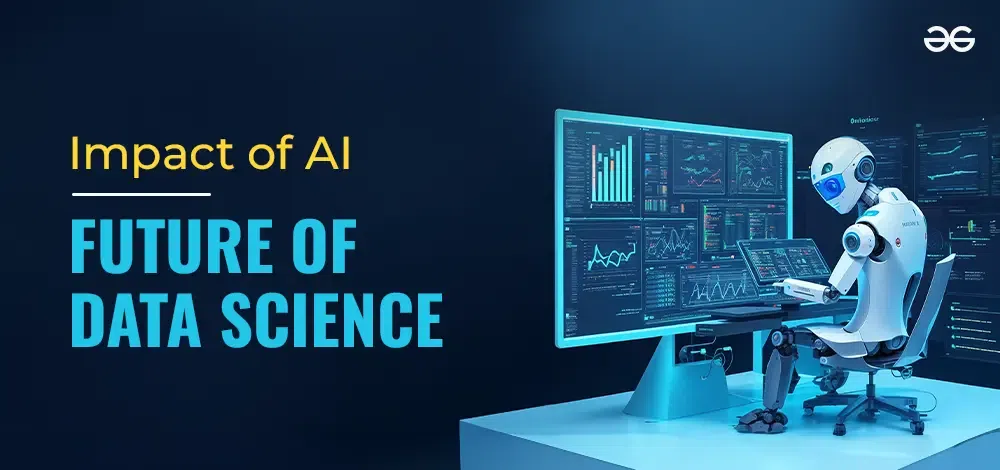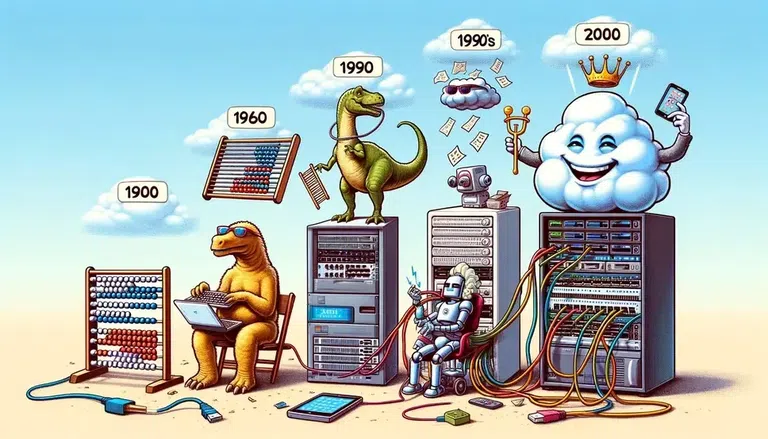What is the impact of AI on the future of data science?
Last Updated :
14 Feb, 2024
Artificial Intelligence has an impact on the human world. In the era of digitization and modernization, it has developed in many fields including knowledge and creativity. It follows the core principle of integrating with the human world and helping them via text generation, decision-making, and research. In this article, we will explore about Impact of AI on the future of data science, the Evaluation of AI in the field of Data Science, the advantages and disadvantages, and the Future of Data Science with AI.
In this comprehensive guide, we delve into the profound effects of AI on data science’s future, explore its evolution within this domain, and weigh the benefits and drawbacks. Furthermore, we’ll forecast the trajectory of data science as it becomes increasingly intertwined with AI innovations.

Impact of AI in Future of Data Science
What is Data Science?
Data Science as per the word itself suggests the relation between the scientific information in the form of data, in a structured manner. It relates to the combination of mathematical and scientific formulas and data which is extracted from an unstructured form. It is highly used by data scientists, engineers, businessmen, and other mathematicians to derive formulas from raw form to structured data and solutions.
It integrates with Artificial Intelligence creating greater impact by allowing conversion of data with these tools. They help in data conversion, text generation, data cleansing, preparing analysis while conducting experiments, and interpretation of data. This whole process is called AI with the integration of Data Science.
What is Generative AI in Data Science & Impact?
Artificial Intelligence is a virtual intelligence system that works with Machine Learning, Self Learning, and Natural Language Processing and is involved in processing data and generating data. It is the development of the computer system and is used as a tool in every field. It is a smart and intelligent system that goes in parallel with human intelligence. Certain Chatbots, Language translators, Voice assistants, and other automated tools are referred to as Generative AI.
Imagine Generative AI as the quirky chef of Data Science, mixing ingredients (data) in unpredictable ways to serve gourmet insights. Sometimes, it whips up a masterpiece, other times, you get a bizarre dessert that predicts the future. It’s like having a culinary genius who occasionally experiments with time travel!
Generative AI in Data Science refers to the tools with the software designed to classify between structured and unstructured data. The things that are ambiguous and indistinguishable by the human eye, the Generative AI in Data Science is capable of that.
What is the evolution of AI in the field of Data Science?
Data Science has undergone many developments, but its history revolves around computer science in the year 1960. When the computer was the device started to be used for data analysis, statistics, and data processing it marked the beginning of Data Sciences. There was an evolution of the storage of databases and computations. The usage of computers through Machine Learning programs shifted to machine learning AI.

With innovations, many industries and other market place started using Artificial Intelligence. Data Scientists use certain frameworks to support integration which are Hadoop and Spark for processing data. The traditional model has been shifted to the modern model marking the Evolution of AI in the field of Data Science.
Did you know that the world of artificial intelligence (AI) is expanding at an incredible pace? Back in 2021, the global AI market was valued at a whopping $59.67 billion. But hold onto your hats, because by 2028, it’s expected to skyrocket to $422.37 billion! That’s a growth rate of 39.4% each year. Meanwhile, in India, the AI scene is also booming, set to grow from $3.1 billion in 2020 to $7.8 billion by 2025. And the number of AI startups? They’ve multiplied by 14 times since the year 2000! It’s clear: AI is not just the future; it’s reshaping our present in unimaginable ways.
Advantages of the Integration of Data Science and Artificial Intelligence
There are certain pros of the integration of Data Sciences and Artificial Intelligence such as:
- It enhances the ability to analyze and research work.
- It becomes a helpful tool for scientists, and mathematicians in formula making.
- Integration helps in identifying patterns and provides insights.
- It generates and works in a personalized way.
- Data sciences with AI help in decision-making and have a huge impact on the market.
- It helps in risk management and is a medium for experimenting.
- AI helps in enhancing capabilities by reducing errors made by humans.
- Healthcare, marketing, business, industries, and scientists have used this technology.
Disadvantages of the Integration of AI and Data Science
There are certain negative aspects as well with the Integration of AI and Data Sciences:
- There are certain security and data leak problems with the integration of AI and Data Sciences.
- There are certain challenges to any dispute or misconduct, there is a lack of regulations.
- Many customers may find it difficult to use the app because of its complexity.
- Many times real-time data is not provided by tools creating ambiguity.
- Concerns relating to privacy issues also have been raised.
- There is less algorithm transparency where no one is accountable for that.
- The decision-making made through AI may be biased.
There are many tools that can be considered as Best AI tools for Data Science such as:
- ChatGPT: It is considered to be the Best AI tool for Data Science because it can write code, poems, essays, summaries, and even jokes. It can help with everything from planning projects and analyzing data to choosing models and fine-tuning settings. With ChatGPT, data experts can save time on coding and focus on solving bigger and more creative problems.
- Bard AI: The following AI is powered by Google itself, the UI is very easy to use. However, the following AI still lacks writing of codes and other languages. Overall, Bard will be seen as having much potential in the future.
- Hugging Face: AI tools such as Hugging Face are much simpler than ChatGPT and is considered to be more precise and reliable. However, the tool is a bit costly and inaccessible to everyone.
- GitHub Copilot: This AI model is finely tooled with data and built-in applications. The AI also provides autocomplete suggestions while coding making it one of the most reliable apps for coders and web developers.
Conclusion
The integration of AI with Data Science has created a huge impact on the future across various industries through its techniques of analysis and large data generation. It collaborates with the field in such a way as to create a positive outcome. It has created AI-centric roles with the economy as well. The work has been streamlined with real-time responses and more predictive models are created to contribute towards healthcare, preparing data analysis, and many more.
FAQs – Impact of AI on the future of Data Science
How do AI tools for Data Sciences help organizations and the economy?
AI is considered to have the ability to learn and adapt to the work environment. Work such as combining algorithms, formulas, and other machine learning are easy for Artificial Intelligence to remember and make use of the data in a Financial manner.
How to ensure security for AI in Data Science?
As AI in Data Sciences works on advanced databases and digital security is the major concern for any AI tool, the basic measures like the General Data Protection Regulation are followed by such developers which ensure maximum security and safety.
What are real-world applications for AI tools acting in Data Sciences?
Applications for AI tools in Data Sciences shall be providing data and real-time information which shall help in innovations, decision-making, E-commerce, and finance departments. It also helps in experimentations, recommendations, sentiment analysis, data cleansing, and preparing algorithms.
What are the factors that need to be taken into consideration for choosing AI Tools for Data Science?
For choosing AI tools for data sciences there are certain factors that needs to be taken care of such as the topic of your project, features of the tool that need to be studied by the user with the knowledge of how to work, and compatibility testing is important.
Share your thoughts in the comments
Please Login to comment...